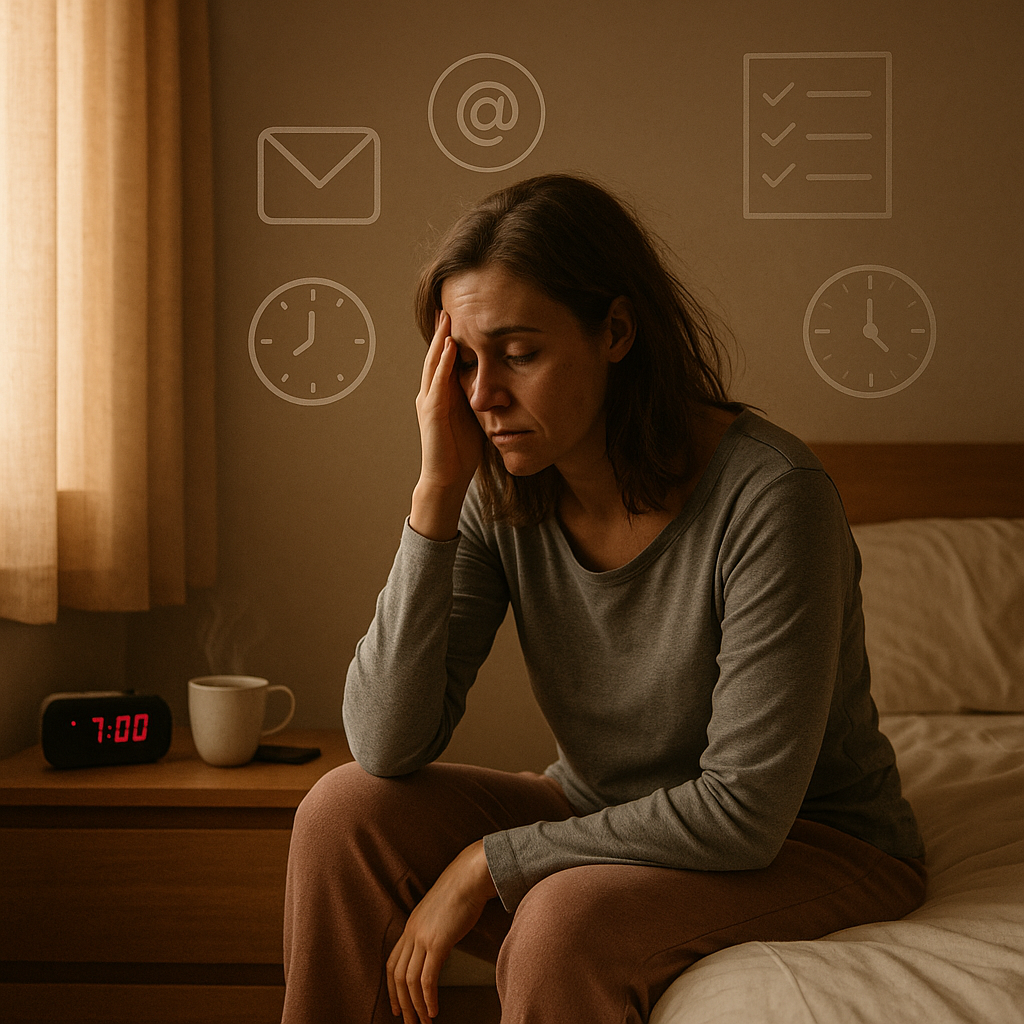Quick Navigation
- The Myth of the “Magic 8 Hours”
- Sleep Debt & Circadian Disruption
- Poor Sleep Hygiene Habits
- Mental Load: The Invisible Drain
- You Might Need Recovery—Not Sleep
- Check Your Health: Hormones, Nutrition & More
- Mental Health & Restless Sleep
- The Digital Drain
- What Real Rest Actually Looks Like
- Summary
The Myth of the “Magic 8 Hours”
We’ve been taught that 8 hours of sleep is the holy grail of rest. But if you’re still exhausted after those golden hours, you’re not alone. The truth is, not all sleep is equal.
The 8-hour rule is a general guideline—not a one-size-fits-all solution. Some thrive on 6.5 hours, others need 9. It’s the quality, not just quantity, that matters.
Sleep Debt & Circadian Disruption
Sleep debt builds silently. Missing even 30 minutes a night adds up over time, leaving your brain foggy even when you think you’ve “caught up.”
On top of that, irregular sleep schedules disrupt your circadian rhythm. This biological clock helps regulate everything from hormones to mood. Disrupting it can lead to low energy and poor sleep cycles.
check: Sleep Foundation: What Is Sleep Debt?
check: CDC: Sleep and Circadian Rhythms
Poor Sleep Hygiene = Poor Recovery
Your bedtime routine might be sabotaging your sleep. Consider:
- Screens: Blue light delays melatonin
- Caffeine: Lingers up to 12 hours in your system
- Late eating: Disrupts digestion and rest
- Inconsistent bedtimes: Confuse your brain
To improve your sleep hygiene:
- Set a fixed bedtime and wake time—even on weekends
- Limit caffeine after 2 PM
- Use dim lighting an hour before sleep
- Replace screen time with calming habits (reading, stretching)
Mental Load: The Invisible Drain on Your Brain
Mental load refers to the ongoing, often invisible mental tasks we carry daily—juggling work projects, family logistics, and social responsibilities.
Especially for women, caregivers, and professionals, this invisible labor keeps the brain busy, even during sleep.
“I sleep but still feel like I haven’t stopped thinking.” — A burned-out teacher
Related: How to Build a Support System That Actually Supports You
Your Body’s Cry for Recovery, Not Sleep
Sleep isn’t the only form of rest. You might be physically resting but still mentally or emotionally depleted.
Explore these types of recovery:
- Sensory rest: Reduce visual/auditory input
- Emotional rest: Allow vulnerability without judgment
- Creative rest: Surround yourself with inspiration
Nutrition, Hormones, and Health Checks
Several hidden health conditions could be contributing to your constant fatigue:
- Iron deficiency
- Low B12 or Vitamin D
- Thyroid imbalances
- Sleep apnea
Consult with a healthcare professional if your fatigue persists despite good sleep habits.
Mental Health and “Restless Rest”
Conditions like anxiety, depression, ADHD, and PTSD can cause mental hyperactivity, even during sleep. Signs include:
- Frequent waking
- Nightmares or vivid dreams
- Feeling unrested despite full hours in bed
Therapy, mindfulness, and consistent routines can help calm the mind and promote deeper rest.
Related: Understanding High-Functioning Anxiety and What to Do About It
Digital Drain: The Hyperconnected Brain
Your smartphone might be your biggest sleep disruptor. Continuous dopamine hits from social media, emails, and notifications keep your brain alert.
Try:
- Going screen-free 2 hours before bed
- Using grayscale mode
- Keeping the phone out of the bedroom
Related: Digital Detox: A Realistic Guide for the Chronically Online
What Real Rest Looks Like (A 360° Fix)
Beyond sleep, rest means intentional recovery in every aspect of life:
- Physical: napping, low-intensity movement
- Mental: meditation, journaling, quiet breaks
- Sensory: silence, darkness, no screens
- Emotional: expressing feelings safely
- Creative: art, music, nature exposure
- Spiritual: prayer, meaning-making, solitude
- Social: boundary setting, nourishing friendships
Sample Daily Reset Plan:
- Morning: Sunlight, 5-minute breathwork
- Afternoon: Tech-free lunch, walk outside
- Evening: Offline by 9 PM, gratitude journaling
Related: How to Build a Support System That Actually Supports You
Why You Wake Up Exhausted Even With Sleep
You may feel tired after 8 hours of sleep because:
- You’re carrying sleep debt
- Your internal clock is out of sync
- Your brain’s still busy from mental overload
- You need diverse forms of rest beyond sleep
- Hidden health issues are at play
- Digital distraction keeps your brain wired
Sleep is only one layer of true recovery.
Start viewing rest as multidimensional—and build a life that honors all of them.



